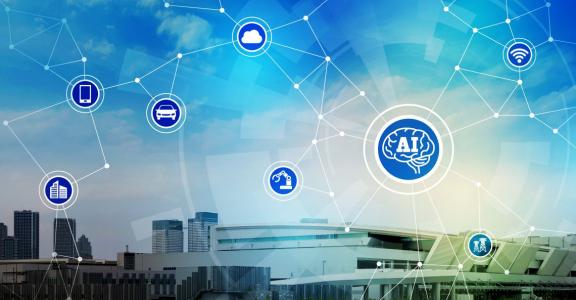The network of European Digital Innovation Hubs (EDIHs) that the European Commission is expanding saw 151 EDIHs set up in 2023, spread across Europe. The aim is to be a one-stop-shop to increase the competitiveness of companies and public actors by helping them meet their digital challenges. There are Six EDIHs active in Belgium: Flanders AI, SustAIn.brussels, Walhub, DIGITALIS, EDIH-CONNECT and EDIH-EBE.
What are EDIHs and what is the role of Sirris and Agoria?
Each European Digital Innovation Hub has its own thematic focus for responding to the needs of companies in the region it supports. The hubs can call on the knowledge of the other regional and international EDIHs.
The service is based on the same four pillars, with which they help companies:
- Selecting and testing technological solutions
- Determining which skills to acquire
- Identifying and finding the types of investments needed
- Setting up local or international partnerships
Based on our role in the Belgian innovation landscape, Sirris and Agoria are involved in the EDIHs SustAIn.brussels, Walhub and DIGITALIS and Flanders AI, where we are variously responsible for coordination or communication, always as part of a consortium of partners. From this role in the EDIH network, we are strengthening our place within the ecosystem. This lets us continue working on ‘joining the dots’ between policy, regional visions, the academic world and companies. Finally, this initiative gives us more scalability for existing initiatives, so that we can achieve a greater impact for our companies.
In this article, you will learn what each of the four EDIHs that Sirris is involved in can do for you and your business.
Find out what European Digital Innovation Hubs can do for your organisation
- SustAIn.brussels
Brussels consists of 99.7 percent SMEs and has a high concentration of digital and service-oriented companies. Digital technology is the main driver of innovation. Despite this, these companies perform slightly below the European average in the use of artificial intelligence (AI) and take third place in the use of ICT for environmental sustainability.
To deal with this, SustAIn.brussels was set up to be a single point of access to digital and sustainable innovation in Brussels, supported by AI and other emerging technologies. This EDIH uses frameworks such as Environmental, Social & Governance (ESG) and the Sustainable Development Goals (SDG) to facilitate the responsible adoption of AI, robotics and the use of data. The hub promotes human-centric, robust and secure digital solutions to benefit society as a whole.
We use an intake interview to see how far companies have come in their digital journey. Then coaches help them further, or connect them with a third party with the expertise needed to achieve the desired solution.
Would you like to know more? Discover sustAIn.brussels by watching this short video
SustAIn.brussels was created with support from the European Commission, Innoviris and hub.brussels and is coordinated by the consortium Sirris, Agoria, BeCentral, VUB and ULB.
Contact: Ludwig De Locht
- WalHub
The European Digital Innovation Hub WalHub focuses on the processing industry and promotes the digitisation of its manufacturing processes. This EDIH offers various services, ranging from awareness-raising to proof-of-concept preparation. The hub focuses on upskilling so that employees can support the digital transition. The goal: more competitiveness and more resilience.
Specifically, Walhub aims to accelerate the adoption of four key technology enablers:
- Artificial intelligence
- Internet of Things technologies (connected objects)
- High-performance computing
- Cybersecurity in the manufacturing process and supply chain.
These technologies are addressed through the various services you can find on the WalHub diary.
To demonstrate these technologies in a logical way, WalHub structures its services around three physical demonstrators that are accessible to its target group of manufacturing companies: A6K (Charleroi), the Liège Science Park and Galaxia (Transinne). These three locations represent WalHub's ‘Test before Invest’ resources.
WalHub bundles together the expertise of the partners involved: Agoria as coordinator of the project, two innovation clusters (MecaTech and Logistics in Wallonia), four research centres (Sirris, Cenaero, CETIC and Multitel), and also Idelux and the Agence du Numérique (AdN). WalHub EDIH is also involved in Digital Wallonia's 'Industry of the Future’ programme.
Contact: Thierry Coutelier
- DIGITALIS
The main objective of the European digital innovation hub DIGITALIS is to help Flemish SME manufacturers make their digital and green transitions. DIGITALIS focuses on two groups of industrial companies: traditional SMEs, to help them get started with new digital technologies, and technology-savvy SMEs, to connect them with each other so that they can gain a competitive advantage on the global market. The ecosystem service of DIGITALIS also brings together both groups of SMEs to create a marketplace for digital solutions and to offer traditional SMEs the opportunity to learn from their peers. Although the focus is on SMEs, support is also offered to larger companies where appropriate, especially if they can be linked to an SME.
The principal objectives of EDIH Digitalis are:
- Boosting the adoption of digital technologies on the workfloors of manufacturing SMEs
- Enhancing digital skills in the workplace
- Playing an active role in the European network of digital innovation hubs
- Actively contributing to the European Green Deal objectives
For example, DIGITALIS acts as a one-stop shop for manufacturing companies that want to digitise their products and processes. Integration into both the regional and European innovation landscape allows SMEs to be able to count on the best available services. While the EDIH is clearly industry-focused, certain concepts, methodologies and tools may also be relevant to government departments – which may also make use of what is on offer.
Finally, DIGITALIS also actively supports the use of digital technologies such as artificial intelligence and cybersecurity, which form the focus of the hub.
Contact: Peter ten Haaf
- Flanders AI
Many Flemish companies are aware of the potential impact of AI (artificial intelligence), but most SMEs have not yet looked into how it can affect their business. Given the technological potential, we naturally want to accelerate the adoption of AI in Flanders. Flanders AI EDIH helps with this, especially for SMEs and government organisations.
What Flanders AI can offer
- The Test before Invest pillar is carried out via Start AI, and experts assist SMEs in their first steps into AI through individual coaching and by performing an initial advisory round and AI feasibility study.
- To provide Skills & Training, a monthly Lunch&Learn AI inspiration session is organised, in which experts present a use-case and make participants aware of the opportunities in their own companies.
- The annual Flanders AI forum brings together all the various Flemish AI stakeholders. They discuss matters with each other, share their experiences and propose new products and applications.
Flanders AI EDIH does not provide support in finding investments but works closely with the DIGITALIS EDIH. Flanders AI EDIH strengthens existing Flemish initiatives. This is to prevent fragmentation of the available AI innovation services and to actively coordinate the range of services through close cooperation with the Flemish Industrial Partnership, the Flanders AI Research Programme, the Flanders AI Academy (VAIA), the Flemish Supercomputer Centre (VSC) and the Enterprise Europe Network (EEN) Flanders.
Contact: Ferdinand Casier (Agoria), +32-(0)475 541 678






